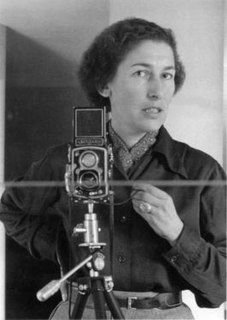A Quote by Gisele Freund
...in the theatre the stage keeps the audience aware of the fictional nature of the action. The reader poring over a magazine, on the other hand, identifies what he sees in the photographs as real.
Related Quotes
With theatre, you can interpret the most complex play on stage for it have meaning to an audience because you're dealing in images, you're dealing in action, you can use different idioms to interpret and clarify something which is obscured in the reading and of course there are different kinds of play, there are mythological plays, there are what I call the dramatic sketches, direct political theatre which is virtually everybody, but I find that you can use the stage as a social vehicle, you know, which any kind of audience.
To live in a world of photographs is to live in a world of substitutes... or so it seems, whose actual referent is always the other, the described, the reality of a world once removed. I prefer, on the other hand, to look at the photographs as something real and of my world, a strange and powerful thing... part of a language, a system of communication, an economy of signs.
Normally classical music is set up so you have professionals on a stage and a bunch of audience - it's us versus them. You spend your entire time as an audience member looking at the back of the conductor so you're already aware of a certain kind of hierarchy when you are there: there are people who can do it, who are on stage, and you aren't on stage so you can't do it. There's also a conductor who is telling the people who are onstage exactly what to do and when to do it and so you know that person is more important than the people on stage.
I can feel how an audience is reacting when I'm on a stage, but when you are on stage, your perception is distorted. That's something you just have to know. It's like pilots that fly at high Gs and they lose, sometimes, consciousness and hand/eye coordination and they just have to know that that's going to happen. They have to be trained to not try to do too much while they are doing that. So when you are on stage, you have to be aware that you are wrong about how it feels a lot of times.
Compare the cinema with theatre. Both are dramatic arts. Theatre brings actors before a public and every night during the season they re-enact the same drama. Deep in the nature of theatre is a sense of ritual. The cinema, by contrast, transports its audience individually, singly, out of the theatre towards the unknown.
I always like to break out and address the audience. In 'The History Boys', for instance, without any ado, the boys will suddenly turn and talk to the audience and then go back into the action. I find it more adventurous doing it in prose than on the stage, but I like being able to make the reader suddenly sit up.
Simply put, meta-writing is writing that is self-conscious, self-reflective, and aware of itself as an artifice. The writer is aware she's writing, and she's aware there's a reader, which goes all the way back to Montaigne's often-used address "dear reader," or his brief introduction to Essais: "To the Reader." It can be done in a myriad of ways.
In the case of drama (stage, movies, television ), there appear to be people in almost every audience who never quite fully realize that a play is a set of fictional, symbolic representations. An actor is one who symbolizes other people, real or imagined. [...] Also some years ago it was reported that when Edward G. Robinson, who used to play gangster roles with extraordinary vividness, visited Chicago, local hoodlums would telephone him at his hotel to pay their professional respects.




































